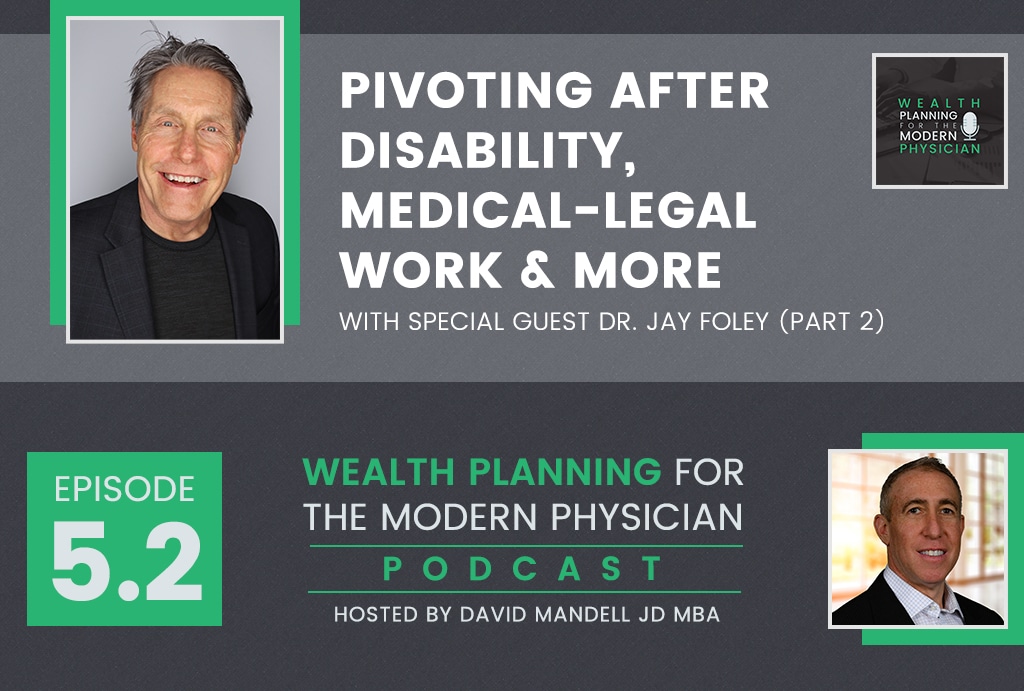
(Video Available October 3, 2024)
Listen in or watch as host David Mandell continues his interview with orthopedic surgeon Dr. John “Jay” Foley, focusing on Jay’s career path after being disabled in a snowboarding accident and unable to perform surgery.
Jay explains how his own-occupation disability policy made a significant impact on his post-injury financial health. He also relates that his initial plan for an osteoporosis center did not workout, so he pivoted to medical evaluation for worker’s compensation cases and medical-legal work as an expert witness.
David and Jay spend the remainder of the interview digging into the pros and cons of both the case evaluation and expert witness work, including what Jay has learned and what advice he gives other physicians about both ventures and about the importance of disability insurance.
TAKEAWAYS:
Takeaway 1: Transitioning from a clinical practice to medical-legal work can be a viable career option for physicians.
Jay initially thought he would continue in clinical practice, focusing on osteoporosis treatment, but ultimately found that path was not the most suitable for him. Instead, he turned his attention to medical-legal work, acting as an expert witness and conducting independent medical exams (IMEs). “I educated myself through a company called SEAK,” Foley shared. “They really helped you realize that you can really do this independently, without a company you work for, profitably, and at your own pace.”
Takeaway 2: The right type of disability policy can provide financial security while offering flexibility in work options.
Dr. Foley’s own-occupation disability policy provided him with the ability to continue seeing patients clinically while still collecting on his disability policy. “Because it was the own occupation policy, once the claim was accepted, I was working two and a half days in the office,” Foley stated. He also highlighted the value of group disability policies, which can offer additional financial protection.
Takeaway 3: There are pros and cons to transitioning to medical-legal work.
Dr. Foley discussed the advantages and drawbacks of his shift to medical-legal work. Flexibility, low overhead costs, and the ability to work from anywhere were among the benefits he mentioned. However, he also pointed out that this type of work can be isolating and challenging, particularly in dealing with complex cases and navigating the legal system. “The cons, it’s a lonely job,” Foley revealed. “You’ve got to be careful with the calendar, you could easily overload your schedule and your commitments.”
Takeaway 4: Physicians, particularly those nearing the end of their careers, need more support in exploring alternative career paths.
Foley expressed his disappointment with the lack of guidance offered by medical societies to senior doctors considering a career shift. He stressed the need for more resources and support to help physicians leverage their expertise and experience in new ways. “I’ve been very, very frustrated with the AAOS, in terms of how much they educate senior doctors in terms of what other professions might be out there at the end of their career,” Foley shared. “They really could do a better job helping senior doctors, or doctors that might be disabled to recreate their life, and what their expertise really has been, and what they’ve learned, and their training, and experience, and being able to use this above and beyond volunteering for the AAOS.”
Takeaway 5: Despite the challenges, medical-legal work can be rewarding and fulfilling for physicians.
Foley had a positive outlook on his shift to medical-legal work and found it to be a rewarding and fulfilling alternative to traditional clinical practice. He emphasized the value of his training and experience in informing his work as a medical-legal expert. “You’re using your training, your expertise through your practice years,” said Foley. “And really, the education, training, and experience that you have is way more than you think, and that’s all these insurance companies and lawyers are asking, is, ‘What does your education, training, experience tell you about what you’re reading in this chart?'”
INSIGHTS
- After his injury, Jay initially planned to continue clinical practice, specifically focusing on osteoporosis and secondary fracture prevention.
- His plan for an osteoporosis clinic at his hospital didn’t materialize
- Jay then activated his role as a California Qualified Medical Evaluator (QME) for workers’ compensation cases, which he continues to do regularly.
- He explored medical-legal work and became an expert witness, attending SEAK courses for training.
- The COVID-19 pandemic temporarily halted his medical-legal work, but demand increased significantly afterward.
- Jay explained that he has found a balance between seeing patients one day a week and working from home on medical-legal cases.
- He highlighted the importance of having a robust disability insurance policy that allowed him to continue working in a non-surgical capacity while collecting benefits.
- Jay shared the value of having both a personal and a group disability policy for comprehensive coverage.
- He advised young doctors to consider the long-term benefits of disability insurance despite its cost.
- Jay emphasized the flexibility and low overhead costs of medical-legal work, which can be done from home.
- He warned about the potential loneliness of medical-legal work and the need to manage one’s schedule effectively.
- He concluded with advice for young doctors to plan for long-term security and consider alternative career paths if needed.

